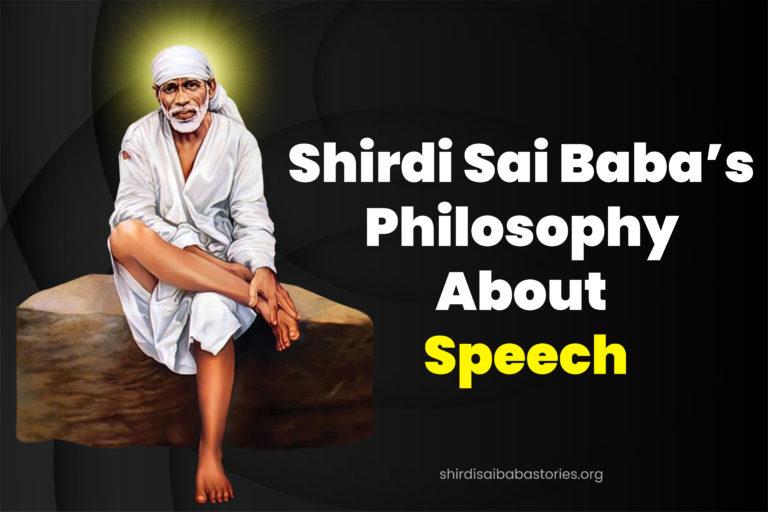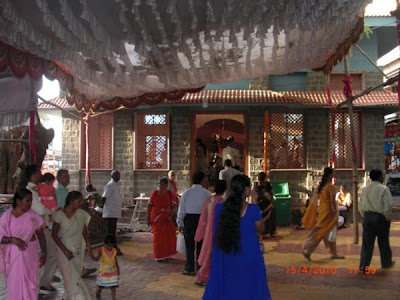
As the Holi festival approaches, we share with you a translation of an excerpt from the “Sai Sarovar” book. This passage is taken from Chapter 32 of Shri Sai Satcharitra, where we learn about the Shimga Holidays, also known as the Holi festival.
Fasting and Mrs. Gokhale – Baba never fasted Himself, nor did He allow others to do so. The mind of the faster is never at ease, then how could he attain his Paramartha (goal of life)? God is not attained on an empty stomach; first the soul has to be appeased. If there is no moisture of food in the stomach and nutrition, with what eyes should we see God, with what tongue should we describe His greatness and with what ears should we hear the same? In short, when all our organs get their proper nutrition and are sound, we can practise devotion and other sadhanas to attain God. Therefore, neither fasting nor overeating is good. Moderation in diet is really wholesome both to the body and mind.

One Mrs. Gokhale came to Shirdi with an introductory letter from Mrs. Kashibai Kanitkar (a devotee of Baba) to Dada Kelkar. She came to Baba with a determination to sit at Baba’s Feet observing a three days fast. The day previous, Baba said to Dada Kelkar, that He would not allow his children to starve during the Shimga, i.e., Holi holidays, and that if they had to starve, why was He there? Next day when the woman went with Dada Kelkar and sat at Baba’s Feet, Baba at once said to her, “Where is the necessity of fasting? Go to Dadabhat’s house, prepare the dish of Puran POlis (wheat rotis with gram-flour and jaggery), feed his children and yourself too.” Shimga holidays were on. Mrs. Kelkar was then in her menses and there was nobody to cook in Dadabhat’s house. So Baba’s advice was very timely. Then Mrs. Gokhale had to go to Dadabhat’s house and prepare the dish as directed. She cooked that day, fed others and herself. What a good story and how beautiful its import!
Our Interpretation – Sai Baba did not believe in fasting, as it could disrupt the balance of the mind and body. Without proper nutrition and hydration, the organs cannot function properly, which can hinder the ability to practice devotion and attain spiritual goals. Baba believed that moderation in the diet was important for overall physical and mental health.
In a specific instance, Baba demonstrated His belief in the importance of nourishment. Mrs. Gokhale visited Baba with the intention of fasting for three days. However, Baba instructed her to prepare a meal for Dadabhat’s family and herself instead. This was during the Shimga holidays, and Baba did not want anyone to go hungry. Mrs. Gokhale followed Baba’s advice and prepared a dish of Puran Polis, which she shared with Dadabhat’s family and herself.
This story shows that Baba was not only concerned with the spiritual well-being of His devotees but also their physical well-being. His instruction to Mrs. Gokhale to prepare and share food emphasizes the importance of nourishing the body in order to be able to pursue spiritual practices. By sharing the meal with others, Mrs. Gokhale also learned the value of generosity and selflessness.
Let us journey back in time to the days of Sai Baba and be a witness to the celebration of Holi in the village of Shirdi with Him.
In 1911, on March 15th, the vibrant and joyous festival of Holi and Rangpanchami was celebrated in the town of Shirdi on a Wednesday. Sai Baba, participated in the festivities with great enthusiasm, donning colorful attire that matched the festive spirit of the occasion. The air was thick with the fragrance of flowers and the sounds of laughter and music filled the atmosphere.
Photos Of Rangpanchami Celebrations At Shirdi 2022
As the festivities unfolded, the revelers engaged in the traditional practice of throwing colorful powder, known as Gulal, at each other, creating a beautiful and vibrant scene. The abundance of Gulal being thrown around was so much that it created a red mist that seemed to encompass the entire sky, adding to the already stunning visual display.
Sai Baba, known for His devotion and love for all, was seen enjoying the festivities with His followers and visitors. His presence added to the spiritual significance of the festival and His joyous demeanor was contagious. The celebration of Holi and Rangpanchami in Shirdi was truly a memorable and unforgettable event, leaving a lasting impression on all those who were fortunate enough to be a part of it.
The festival of Holi and Rangpanchami had the entire village of Shirdi buzzing with excitement. The streets were awash with a kaleidoscope of colors and the air was thick with the fragrance of flowers. Pilgrims from far and wide had come to be a part of the festivities.
In the midst of all the revelry, Tarabai Takhand suddenly let out a piercing scream. Her eyes were fixed on the ground below where a young goat was thrashing about, clearly suffering in the intense heat of the day. Tarabai’s tender heart could not bear to see the innocent creature in such agony. Without a moment’s hesitation, she rushed to the goat’s side and scooped it up in her arms.
As she held the struggling goat, Tarabai’s heart was filled with a deep sense of sadness. She realized that the little creature had lost its life after she took it in her hands, and she felt a sense of responsibility for not being able to protect it.
Tears streamed down Tarabai’s face as she gently laid the goat to rest. Her face was smeared with dirt and her clothes were stained with the vibrant colors of the festival. But all that mattered to her at that moment was the innocent life that had been lost.
The incident left a profound impact on the people of Shirdi, reminding them of the importance of compassion and empathy towards all living beings. And so, the festival of Holi and Rangpanchami became not just a celebration of colors and joy, but also a reminder of the beauty of kindness and humanity.
Saibaba was known for His kind and gentle demeanor. His heart was filled with compassion and His face reflected a sense of sensitivity and softness that was unparalleled. As He looked upon Tarabai with concern, His heart melted at the sight of the distress on her face.
In His melodious voice, Saibaba spoke to her, “O dear! What is so disappointing about it? Why don’t you twist it a little to check whether that kid is dead?” His words were filled with a sense of reassurance and comfort, offering Tarabai a glimmer of hope in her moment of despair.
The festive atmosphere in the village of Shirdi came to an abrupt halt as the people paused their play with colors and mud. They all seemed to be in agreement as they spoke in unison, “No, Baba, Tarabai is telling the truth, that kid is truly dead.”
However, Saibaba was not convinced. He spoke up and said, “Come on, let’s see! I shall show you whether that kid is truly dead or alive.”
Saibaba hurried to Dwarkamai and fetched a tumbler filled with water. He approached the lifeless body of the baby goat and took water in His hand, splashing it three times around the kid. He then sprinkled some water on the kid’s mouth, and to everyone’s amazement, the kid’s stomach began to beat slowly. After a few moments had passed, the baby goat stirred and eventually woke up. In a miraculous turn of events, the kid took a plunge and ran away in front of the eyes of the people who were playing Holi just moments ago.
The people of Shirdi were left in awe of Saibaba’s power and compassion. Through his actions, he demonstrated the true essence of life and the power of faith. His teachings and deeds continue to inspire millions of people around the world to this day.
In a world that can often be harsh and unforgiving, Saibaba’s legacy reminds us of the importance of empathy and compassion towards all living beings. His example teaches us that even in the darkest of moments, there is always hope and the possibility of a brighter tomorrow.
Conclusion: Though the story is a short one it gives us a glimpse of the celebration of Holi in Shirdi in old times. Not just Saibaba, His devotees are compassionate enough towards all living beings and He encourages such deeds of kindness.
List of Devotees of Sai Baba of Shirdi
© Shirdi Sai Baba Life Teachings and Stories – Member of SaiYugNetwork.com




wow! a beautiful gem! thanks for sharing Baba’s leelas!
Happy Holi Baba, our Sai Krishna!
Love you Deva! Jai Sai Samarth!